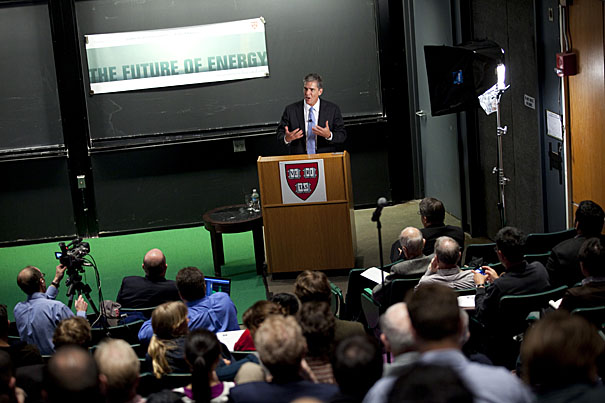
According to Shell Oil President Marvin Odum, energy from renewable sources would surge in the coming decades, to a scale that today would equal 60 percent of production. But with the global population expected to climb to 9 billion and the increasing industrialization of the developing world, he expected overall demand to grow enough that renewable sources will make up just 30 percent of the 2050 energy mix.
Stephanie Mitchell/Harvard Staff Photographer
The future energy mix
Shell chief sees rise of renewables, but with fossil fuels still important
Shell Oil Co. President Marvin Odum said he expects global energy demand to double by mid-century, with renewable sources making up a much greater part of the supply than they do now, and with fossil fuels remaining a major part of the mix.
Odum, who spoke Tuesday (April 27) at the Science Center, delivering the Harvard University Center for the Environment’s final “Future of Energy” lecture of the academic year, presented his views and those of the oil industry giant as it looks ahead.
According to Odum, energy from renewable sources would surge in the coming decades, to a scale that today would equal 60 percent of production. But with the global population expected to climb to 9 billion and the increasing industrialization of the developing world, he expected overall demand to grow enough that renewable sources will make up just 30 percent of the 2050 energy mix.
Much of the rest, he said, must come from fossil fuels, making mitigation technologies that keep carbon from being released into the atmosphere essential.
“Supply is going to have trouble keeping up with that kind of demand growth,” Odum said. “All forms of energy will be needed.”
Consequently, environmental stresses due to energy consumption also will increase, Odum said, resulting in more government regulation. He came to Harvard, in fact, expecting to talk about the new U.S. energy and climate bill, but negotiations on it collapsed last week when one of the sponsors, Republican Sen. Lindsey Graham, abruptly withdrew from talks with Democrats. Though the halt was surprising, Odum said he still expects some type of energy legislation to be passed.
The global energy industry is so enormous that major changes take a lot of time, Odum said. A look at the past century shows that it takes almost 30 years for any new energy source to reach even 1 percent of the market, he said. First come years of research and development, followed by small demonstration plants that lead to further improvements. That is followed by larger commercial plants that take a long time to site and build. Biofuels are now about 1 percent of the market, and wind will be about 1 percent by the middle of the decade.
That slow development pattern will have to be radically sped up, he said, if renewables are to be 30 percent of the mid-century energy mix. Government can help, with regulations and incentives. Odum said that government establishment of a carbon market, with pricing and trading, will be a big factor driving growth of renewable energy sources. Without that, he said, it will be difficult to attract the kind of private capital needed to finance that growth, and it is unlikely government will step in to fill the gap.
Odum said he sees the industry having several roles to play in the future. First, it needs to provide more energy to meet demand. Second, it needs to increase the efficiency of its operations. Third, it needs to provide more low-carbon energy.
Carbon capture and storage is an example of the third role, Odum said. Shell has begun one such large project associated with its oil sands effort in Canada. It’s being done in partnership with the Canadian government, which has invested $800 million. He expects to begin injecting carbon into underground storage areas by 2015 at the earliest.
Another example is Shell’s continued investment in natural gas. Though a fossil fuel, gas produces much less carbon dioxide than either oil or coal. By 2012, natural gas is expected to make up more than half of Shell’s production.
Odum said the company expects the number of motor vehicles to double worldwide by mid-century, with 40 percent of miles driven by electric-powered vehicles. That expected explosion in demand for transportation fuels has Shell investing in biofuels, working with a producer in Brazil.
Though Shell was not involved, Odum also addressed the recent Gulf of Mexico oil drilling platform tragedy and the spill that has resulted. Such platforms, he said, have so many redundant systems that he doesn’t understand how the tragedy happened. Whether the accident and the resultant oil pollution affects the acceptability of offshore drilling elsewhere depends on how the situation is resolved and how successful mitigation efforts are, he said.





